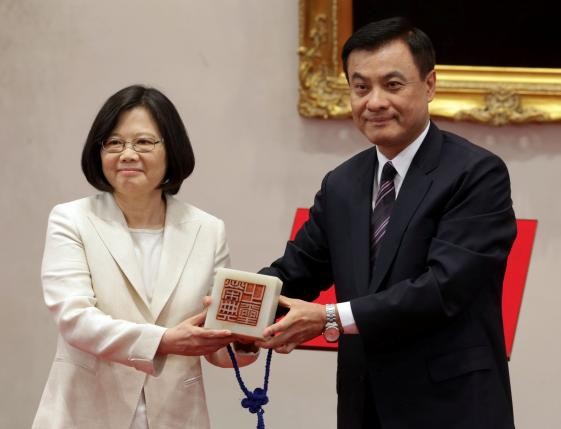Media Report

- The New York Times reports: "Taiwan's new president called on China to look beyond the divisions of history for the benefit of people on both sides of the Taiwan Strait, as she pledged in her inauguration speech on Friday to promote local industry and push the island's global trade links to help revive a stagnant economy....Ms. Tsai offered few surprises in her address outside Taiwan's Presidential Office in central Taipei. She emphasized domestic issues, like the need to change Taiwan's pension, education and judicial systems, provide better job opportunities for young people, protect the environment and ensure food safety....In discussing the relationship with China, she steered a cautious line between the demands of her base in the Democratic Progressive Party, which has traditionally supported Taiwan's independence, and China's longstanding threats of force to block any move to formalize such a position."
- Reuters reports: "Beijing demanded an end to U.S. surveillance near China on Thursday after two of its fighter jets carried out what the Pentagon said was an 'unsafe' intercept of a U.S. military reconnaissance aircraft over the South China Sea....A U.S. Defense official said two Chinese J-11 fighter jets flew within 50 feet (15 meters) of the U.S. EP-3 aircraft. The official said the incident took place east of Hainan island....'It must be pointed out that U.S. military planes frequently carry out reconnaissance in Chinese coastal waters, seriously endangering Chinese maritime security,' China's Foreign Ministry spokesman Hong Lei Hong told reporters. 'We demand that the United States immediately cease this type of close reconnaissance activity to avoid having this sort of incident happening again,' Hong said."
- BBC News reports: "China is 'flooding' social media with comments by paid supporters in a bid to sway public opinion, a report has said....The government and its army of helpers write 488 million fake posts a year, the report said....The vast majority of the comments and posts made on social media are crafted to look like they come from ordinary people, said the authors of the paper, who were led by Gary King from Harvard's department of government....'They do not step up to defend the government, its leaders, and their policies from criticism, no matter how vitriolic; indeed, they seem to avoid controversial issues entirely,' said the paper. 'Letting an argument die, or changing the subject, usually works much better than picking an argument and getting someone's back up,' it said."
Calendar
- 2016-05-19 China, Denying Close Encounter With American Plane, Points Finger at U.S.
- 2016-05-18 China criticizes US steel anti-dumping measures
- 2016-05-17 Top ranked Chinese official to 'listen' to HK demands as independence calls grow
- 2016-05-16 China Housing Revival Buffers Economy
- 2016-05-15 Maoists Still a Force 50 Years After the Cultural Revolution
- 2016-05-13 Apple invests $1 billion in Chinese ride-hailing service Didi Chuxing
- 2016-05-12 EU lawmakers reject market economy status for China
- 2016-05-11 Ahead of inauguration, China says Taiwan to blame for any crisis
- 2016-05-10 U.S. Sails Warship Near Island in South China Sea, Challenging Chinese Claims
- 2016-05-09 EU Envoy Calls for Fairer Economic Relationship With China
News
- The New York Times Taiwan President Takes Cautious Line on China at Inauguration
- Reuters China demands end to U.S. surveillance after aircraft intercept
- BBC News China 'flooding' social media with fake posts
- Bloomberg Business Defaults Throw Wrench in China's $3 Trillion Company Bond Engine
- The Wall Street Journal China Drug Deal Will Slash Prices of Top-Selling Treatments by Up to 67%
- The Washington Post Taiwan's leader faces thornier ties with China, growth woes
- The New York Times Chinese Government-Backed Social Media Users Flood Web
- Reuters New Taiwan president pledges peace, urges China to drop historical baggage
- The Wall Street Journal Big Chinese Banks Issue New Yuan-Denominated Debt In U.S.
- The Washington Post Female Power: US, China look to women for medals in Olympics
- The New York Times Benigno Aquino Says U.S. Must Act if China Moves on Reef in South China Sea
- The Financial Times China reopens securitised bad-debt market
- Bloomberg Business The Iron Mountain on China's Doorstep Tops 100 Million Tons
Commentary
- Foreign Policy: Tea Leaf Nation Meet the Chinese Trolls Pumping Out 488 Million Fake Social Media Posts
- The Wall Street Journal Obama Front-Runs Trump on China
- The Diplomat China's On-Again, Off-Again P2P Lending
- The Economist Inaugural manoeuvres: China v China
- The National Interest Is the United States and China Destined for a Deadly Collision in the Sky?
- The Wall Street Journal: China Real Time Swaying to the Music of Beijing: Tim Cook's Week in China
- The Diplomat China Helped Reveal N. Korean Cheating on Denuclearization: NSA Leaks
